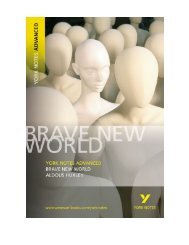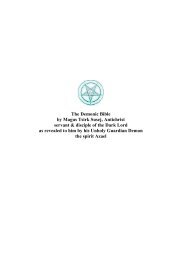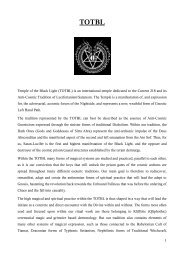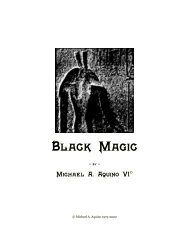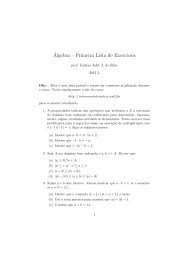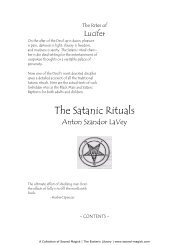Satanism Today - An Encyclopedia of Religion, Folklore and Popular ...
Satanism Today - An Encyclopedia of Religion, Folklore and Popular ...
Satanism Today - An Encyclopedia of Religion, Folklore and Popular ...
You also want an ePaper? Increase the reach of your titles
YUMPU automatically turns print PDFs into web optimized ePapers that Google loves.
Appendix II: 1992 FBI Study <strong>of</strong> Satanic Ritual Abuse 319<br />
debate is over how much investigation is enough. <strong>An</strong>y<br />
law enforcement agency must be prepared to defend <strong>and</strong><br />
justify its actions when scrutinized by the public, the<br />
media, elected <strong>of</strong>ficials, or the courts. This does not<br />
mean, however, that a law enforcement agency has an<br />
obligation to prove that the alleged crimes did not occur.<br />
This is almost always impossible to do <strong>and</strong> investigators<br />
should be alert for <strong>and</strong> avoid this trap.<br />
One major problem in the investigation <strong>of</strong> multidimensional<br />
child sex rings is the dilemma <strong>of</strong> recognizing<br />
soon enough that you have one. Investigators must be<br />
alert for cases with the potential for the four basic<br />
dynamics: (a) multiple young victims, (b) multiple<br />
<strong>of</strong>fenders, (c) fear as the controlling tactic, <strong>and</strong> (d)<br />
bizarre or ritualistic activity. The following techniques<br />
apply primarily to the investigation <strong>of</strong> such multidimensional<br />
child sex rings:<br />
Minimize Satanic/Occult Aspect<br />
There are those who claim that one <strong>of</strong> the major reasons<br />
more <strong>of</strong> these cases have not been successfully prosecuted<br />
is that the satanic/occult aspect has not been aggressively<br />
pursued. One state has even introduced legislation<br />
creating added penalties when certain crimes are<br />
committed as part <strong>of</strong> a ritual or ceremony. A few states<br />
have passed special ritual crime laws. I strongly disagree<br />
with such an approach. It makes no difference what<br />
spiritual belief system was used to enhance <strong>and</strong> facilitate<br />
or rationalize <strong>and</strong> justify criminal behavior. It serves no<br />
purpose to “prove” someone is a satanist. As a matter <strong>of</strong><br />
fact, if it is alleged that the subject committed certain<br />
criminal acts under the influence <strong>of</strong> or in order to conjure<br />
up supernatural spirits or forces, this may very well<br />
be the basis for an insanity or diminished capacity<br />
defense, or may damage the intent aspect <strong>of</strong> a sexually<br />
motivated crime. The defense may very well be more<br />
interested in all the “evidence <strong>of</strong> satanic activity.” Some<br />
<strong>of</strong> the satanic crime “experts” who train law enforcement<br />
wind up working or testifying for the defense in<br />
these cases.<br />
It is best to focus on the crime <strong>and</strong> all the evidence<br />
to corroborate its commission. Information about local<br />
satanic or occult activity is only <strong>of</strong> value if it is based on<br />
specific law enforcement intelligence <strong>and</strong> not on some<br />
vague, unsubstantiated generalities from religious<br />
groups. Cases are not solved by decoding signs, symbols,<br />
<strong>and</strong> dates using undocumented satanic crime “manuals.”<br />
In one case a law enforcement agency executing a<br />
search warrant seized only the satanic paraphernalia<br />
<strong>and</strong> left behind the other evidence that would have corroborated<br />
victim statements. Cases are solved by people-<strong>and</strong><br />
behavior-oriented investigation. Evidence <strong>of</strong><br />
satanic or occult activity may help explain certain<br />
aspects <strong>of</strong> the case, but even <strong>of</strong>fenders who commit<br />
crimes in a spiritual context are usually motivated by<br />
power, sex, <strong>and</strong> money.<br />
Keep Investigation <strong>and</strong> Religious Beliefs Separate<br />
I believe that one <strong>of</strong> the biggest mistakes any investigator<br />
<strong>of</strong> these cases can make is to attribute supernatural<br />
powers to the <strong>of</strong>fenders. During an investigation a good<br />
investigator may sometimes be able to use the beliefs<br />
<strong>and</strong> superstitions <strong>of</strong> the <strong>of</strong>fenders to his or her advantage.<br />
The reverse happens if the investigator believes<br />
that the <strong>of</strong>fenders possess supernatural powers.<br />
Satanic/occult practitioners have no more power than<br />
any other human beings. Law enforcement <strong>of</strong>ficers who<br />
believe that the investigation <strong>of</strong> these cases puts them in<br />
conflict with the supernatural forces <strong>of</strong> evil should<br />
probably not be assigned to them. The religious beliefs<br />
<strong>of</strong> <strong>of</strong>ficers should provide spiritual strength <strong>and</strong> support<br />
for them but should not affect the objectivity <strong>and</strong> pr<strong>of</strong>essionalism<br />
<strong>of</strong> the investigation.<br />
It is easy to get caught up in these cases <strong>and</strong> begin to<br />
see “satanism” everywhere. Oversensitization to this<br />
perceived threat may cause an investigator to “see”<br />
satanism in a crime when it really is not there (quasisatanism).<br />
Often the eye sees what the mind perceives. It<br />
may also cause an investigator not to recognize a staged<br />
crime scene deliberately seeded with “satanic clues” in<br />
order to mislead the police (pseudo-satanism). On rare<br />
occasions an overzealous investigator or intervenor may<br />
even be tempted to plant “evidence <strong>of</strong> satanism” in<br />
order to corroborate such allegations <strong>and</strong> beliefs.<br />
Supervisors need to be alert for <strong>and</strong> monitor these reactions<br />
in their investigators.<br />
Listen to the Victims<br />
It is not the investigator’s duty to believe the victims; it is<br />
his or her job to listen <strong>and</strong> be an objective fact finder.<br />
Interviews <strong>of</strong> young children should be done by investigators<br />
trained <strong>and</strong> experienced in such interviews.<br />
Investigators must have direct access to the alleged victims<br />
for interview purposes. Therapists for an adult survivor<br />
sometimes want to act as intermediaries in their patient’s<br />
interview. This should be avoided if at all possible.<br />
Adult survivor interviews are <strong>of</strong>ten confusing difficult<br />
<strong>and</strong> extremely time-consuming. The investigator<br />
must remember however that almost anything is possible.<br />
Most important the investigator must remember<br />
that there is much middle ground. Just because one<br />
event did happen does not mean that all reported events<br />
happened, <strong>and</strong> just because one event did not happen<br />
does not mean that all other events did not happen. Do<br />
not become such a zealot that you believe it all nor such<br />
a cynic that you believe nothing. Varying amounts <strong>and</strong><br />
parts <strong>of</strong> the allegation may be factual. Attempting to find<br />
evidence <strong>of</strong> what did happen is the great challenge <strong>of</strong><br />
these cases. All investigative interaction with victims<br />
must be carefully <strong>and</strong> thoroughly documented.<br />
Assess <strong>and</strong> Evaluate Victim Statements<br />
This is the part <strong>of</strong> the investigative process in child sexu-



